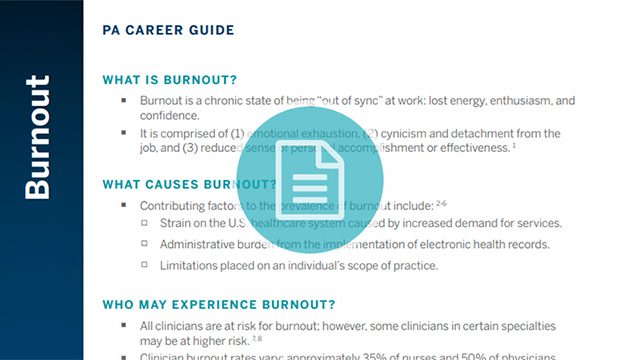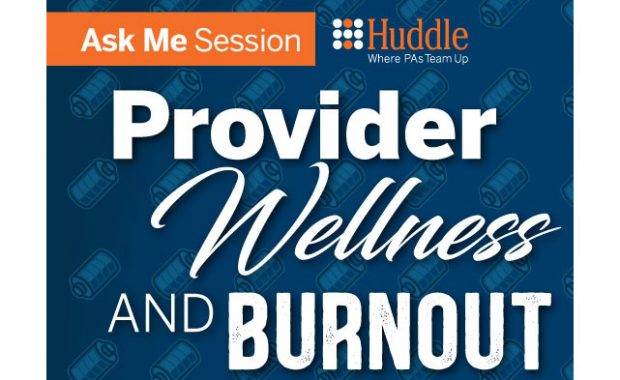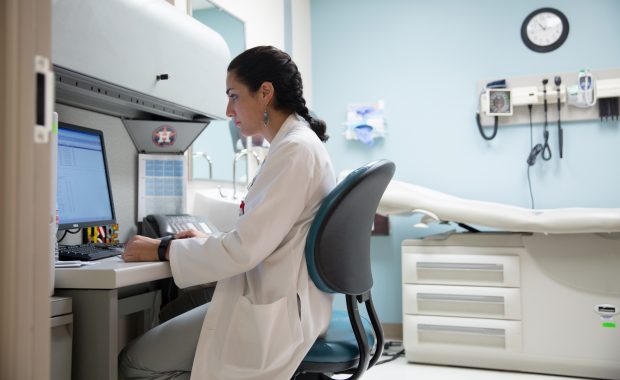Career Resources
Unlock the Doors to PA School with these CASPA Tips
The journey toward becoming a PA begins with the pivotal application to PA school. Pre-PAs who plan to apply to PA school this cycle should take note of the following important takeaways.
Key Networking Tips for Pre-PAs
Do you want to learn from the experiences and insights of PA and PA student experts? This article includes the biggest takeaways from participants of the Pre-PA Virtual Mixer, including how to prepare for PA school and excel in your career as a PA.
Applying to PA School: How to Choose the Right Program
Deciding what PA programs to apply to can be a challenge. It’s important for prospective students to select programs that meet their educational desires and complement their strengths. Follow our top tips for evaluating programs and earn your seat in the next PA cohort.
Taking A Sabbatical
PAs report high job satisfaction but also suffer from burnout, which can take extended periods to fully recover from. Taking a sabbatical from the profession has many benefits and can help foster burnout recovery.
How to Find PA Shadowing in the Era of COVID-19
Shadowing hours can strengthen your PA School application and show the admission committee you understand the unique role PAs play in healthcare. Here are three ways you can secure shadowing hours.
What Every Pre-PA Needs to Know About PA School Interviews
Are you ready to ace your PA school interview? Follow these top tips to help you succeed.
Burnout Can Occur Early Among PAs and PA Students
Although one might think that burnout only occurs in seasoned PA providers, even students can experience burnout. There is hope for the student and early career PA. A national trend toward addressing the mental health of our medical providers includes new assessments and onboarding.
PA Wellness
At AAPA, we’re here to support your PA well-being and fight PA burnout by ensuring your emotional, physical, social, workplace, and societal well-being.

Blueprint for Addressing Physician Assistant Well-being and Burnout
The goal of the Blueprint for Addressing PA Well-Being and Burnout is to provide a brief overview of what is currently known about PA burnout and well-being, and more importantly, provide an enduring framework for increasing PA engagement at work and improving the well-being of the profession.

Feeling Unfulfilled? You Might Need a New Job
Changing jobs is one of the most impactful ways of creating positive change in your PA career. Is it time for you to move on from a position that is no longer inspiring, sustainable, or financially rewarding?

Sponsored
Locum Tenens Offers Work/Life Balance and a Fresh Start
PAs can turn to locum tenens as a full-time career alternative that allows them to take control of their own schedule, establish a better work/life balance, and enjoy a regular change of scenery.

Getting Ahead of Burnout: Experts Share Tips for Provider Well-being
Huddle’s latest Ask Me session on burnout and clinician wellness enlisted experts Eric Tetzlaff, PA-C, DFAAPA, and Susan Kopynec, MPAS, PA-C Emeritus, DFAAPA, to offer up-to-date information and tips for providers to maintain their well-being and avoid burnout.

How PAs Can Take on More Responsibility Without Burning Out
As we advance in our careers, it’s natural to want to take on more responsibility. But there’s a tricky balance – we don’t want our PA practice or our enthusiasm for healthcare to suffer. Follow these four tips to take on more without burning out.

Sponsored
Why I Changed Specialties as a PA
One of the major advantages of becoming a PA is that it is relatively easy to change from one specialty to another without the need for new certification. More than 50% of PAs will change specialties during their careers, according to AAPA’s Salary Report.
The Balancing Act
Having the right work-life balance can reduce stress for medical professionals as well as increase on-the-job focus, resulting in high job satisfaction and career success, healthier patients—and a healthier provider. However, maintaining that balance can be more daunting than ever before for those in healthcare.

